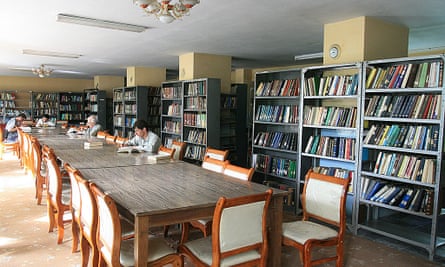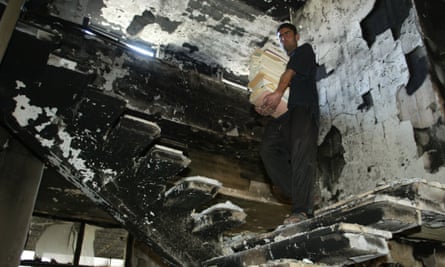The Vanished Library in Cairo, Egypt
A converted villa in an affluent district of south Cairo is home to the Bardo Clubhouse, a buzzing cultural hub with a library on its ground floor. Founded by passionate book lover Omar Amin, who left his job in marketing in November to dedicate himself to the library full time, the multilingual collection is made up of donations, including a first edition Harry Potter and a 1927 edition of Kafka’s Amerika which Amin found while rummaging through the Egyptian capital’s book markets.
It is a risky time to be setting up. Al-Karama library was raided in December 2016 by Egyptian security forces, part of a larger crackdown on freedom of expression. According to the Committee to Protect Journalists, 20 journalists were imprisoned in 2017, and Egyptian writer and activist Basma Aziz reports that “many publishing houses are subjected to harassment”. But despite the risks, Amin wants to encourage people in the frantic city of Cairo to rediscover the simple pleasure of reading.

Kabul public library, Afghanistan
Founded from the amalgamation of two small libraries in 1966, Kabul Public Library has witnessed the communist regime, a civil war, the rule of the Taliban, and the instability that has racked the country since the coalition invasion in 2001.
Violence is rising in Kabul, and the library is in a state of disrepair. “The ongoing conflict has hampered library services and many people are afraid to stay out of their homes for any length of time,” says Qayoom Suroush, an analyst focusing on Afghanistan. “In short, they need everything that is required for a modern library. They need new books, modern management systems, professional librarians and buildings.”
Afghanistan has many pressing needs, but the library is crucial as a place for social and academic exchange, Suroush maintains, adding that it “can help young people understand that there is no single reading on Islam and everyone has a right to their beliefs”.

Unnamed library in Mogadishu, Somalia
It may not yet have a name, but the slick black-and-white space which is poised to open as a library in Mogadishu confounds western stereotypes of the Somalian capital.
With frequent attacks from the Islamist group al-Shabaab and the country on the brink of famine, Mogadishu is a challenging place to live and work. But Badra Yusuf and Abdulrahim Aden, who are helping to set up the library, hope it can contribute to a culture of reading.
In the short term, we need books. The Roseau Public Library lost its roof and got a lot of water. #dominica #hurricanemaria pic.twitter.com/J5GrkXr5hV
— Schuyler Esprit (@schuyleresprit) October 3, 2017
Roseau public library, Dominica
With roots reaching all the way back to 1843 and a handsome building constructed in 1906, Roseau public library boasted a collection of black history and Caribbean literature spanning over 100 years. But when Hurricane Maria struck the island last year, the library lost its roof and 25,000 books.
The library reopened in a temporary space at the National Documentation Centre in December 2017, after Book Aid donated 2,000 books. Librarian Veranda Raymond says she remains committed to providing a service, especially for students who lost books, internet connections and places for study in the storm. “Our space is limited,” she said, “however, we are making it work to support our members.”
Raymond says the library service is planning to rebuild, though with climate change already pushing the islands into new patterns of weather, Dominican librarians will have to brace themselves for more disruption in the future. Eventually, she says, the plan is to rebuild a library, although that will require money.

Iraq National Library and Archive, in Baghdad, Iraq
The Iraq National Library and Archive has seen plenty of turbulence since it was founded in 1920. But during the US-led invasion of Iraq in 2003 the library was burned and looted, losing 60% of the archives and 95% of the collection of rare books.
Rebuilding and keeping the library open among the chaos of the years that followed was no easy task. Writing on the British Library website, the director, Saad Eskander, described the aftermath of a 2007 bombing: “Tens of thousands of papers were flying high, as if the sky was raining books, tears and blood. The view was surreal. Some of the papers were burning in the sky.” He told the Guardian in 2008: “I never have a bodyguard because that attracts attention. This idea of having bodyguards, changing cars two or three times, is very stupid. If they want to kill you, they will do it. If you are lucky you will stay, if not, you will be killed.”
The situation in Baghdad has improved since the darkest days of the post-invasion instability, but it remains a dangerous city – a bomb in January killed at least 35. But the library is still open, five days a week.
